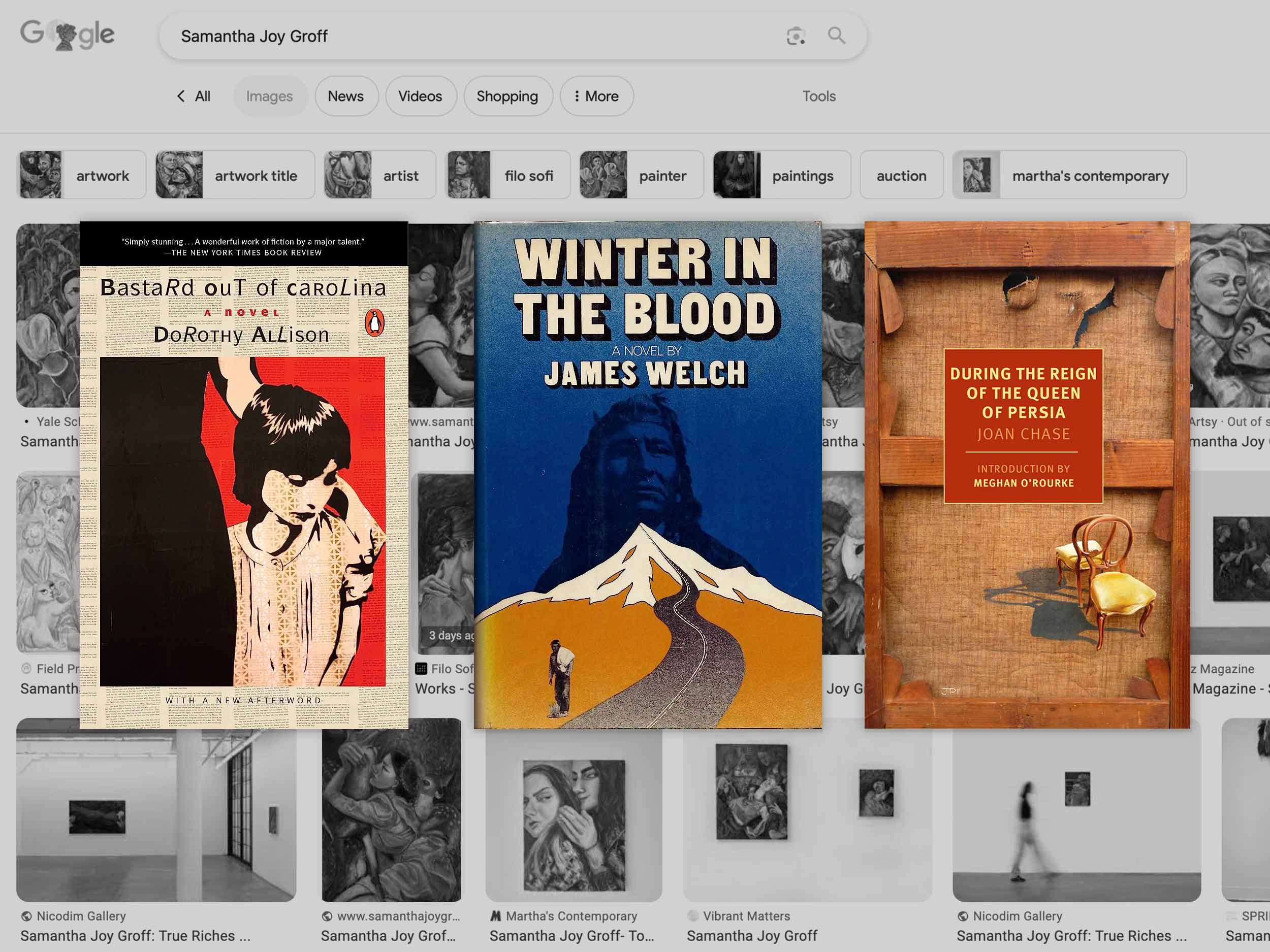From a hauntingly prescient bildungsroman to a sardonic story of working-class life, the emerging painter offers Document tales of family, survival, and longing
If her Instagram handle @redneckhotwife is any indication, Samantha Joy Groff thinks a lot about womanhood and rural living—and not without a dose of humor. Her works explore the borderlands between insular, faith-based communities and contemporary worldliness, depicting the agrestic mundane with a warped, Mannerist refinement: In one of her paintings, a lazy-eyed woman caresses a buck carcass; in another, a duo of bonnet- and cowboy boot-clad girls lay in turquoise grass, heads twisted to avoid the audience’s gaze. Braiding pastoral fauna, carnal desire, and Dutch-American conservatism, Groff’s ultimate subject is her girlhood spent in ‘Pennsyltucky.’ Her booklist for Document is similarly shaped by her upbringing: Read on for picks that center strong women, survival, complicated families, rural spaces, and intense longing.
Bastard Out of Carolina by Dorothy Allison
“Bastard Out of Carolina ought to be considered a seminal text for any creative making work about rural living. It was one of the few books I found that didn’t caricaturize rural people, but still spoke on intense realities. Allison gets to the brutal truths of her upbringing in South Carolina; her lived experience makes the story’s pain palpable, and feels like a kind of catharsis. She doesn’t give her audience the satisfaction of the protagonist—a little girl named Bone—getting out of her unfortunate circumstance. So many rural stories in popular culture like Educated or Hillbilly Elegy make it conditional for their characters to be deserving of empathy. The triumph of Bone was her resilience, and that enough is worthy of empathy from the reader. The lack of justice served for Bone is a harsh truth of some people’s lives.”
Manual for Cleaning Women by Lucia Berlin
“Lucia Berlin’s storytelling makes the mundane glitter where small passing moments expand heavy with importance. Many of the short stories borrow from her life and travels—some feature her struggle with alcoholism in a way that strips away the overly dramatized Hollywood feel of addiction. The moments of sadness in the stories make no time for self pity, but lie subtle, weaving humor into the everyday. Berlin’s time as a cleaning lady evokes a nostalgia for my own unremarkable jobs waitressing and doing construction work. There is a familiarity in her character adding change to a woman’s ashtray to combat the rumor that cleaning ladies steal, while taking the employer’s sleeping pills to save for a rainy day.”
“So many rural stories in popular culture like Educated or Hillbilly Elegy make it conditional for their characters to be deserving of empathy. The triumph of Bone was her resilience, and that enough is worthy of empathy.”
Winter in the Blood by James Welch
“Set on the Fort Belknap Reservation in Montana where Welch grew up, an unnamed character is wandering through the grief of losing his brother. The sorrow twined throughout the novel isn’t typical depression, but more the story of a wandering soul lost and searching. The writing style is stripped bare of anything more than earnest confession. It unfolds through a quiet landscape narrated by a voice that has known its history and voices intimately, often reading like poetry. I love how animals play a significant role in the story: in describing the work at the ranch, the character’s childhood, and, of course, symbols of the Montana landscape—especially the heart-wrenching passage where the character speaks to his aging horse, Bird, and acknowledges the animal’s spirit. Their kinship goes beyond his function on the family ranch.”
Dark Springs by Unica Zurn
“A haunting coming-of-age story based on the author’s life that pushes the boundaries of sexuality, taboo, and violence, this novel unravels as a fantasy that takes place in an isolated girlhood marked with despair. Published in 1969, the German author and artist wrote her own ending in the book before seeing it through. The theme of obsession tests the reader’s comfort, pushing limits that I am constantly negotiating in my own work. Raw desire and intense negative emotions culminate in unspeakable acts, but it doesn’t read as shocking for the sake of shock.”
During the Reign of the Queen of Persia by Joan Chase
“Chase’s childhood growing up in Ohio during the Great Depression serves as the backdrop of this book. Its seemingly idyllic, pastoral landscape hosts a family matriarch run by a rough Gram, her children, and the collective narration of four cousins—two sets of sisters— as they grow up. Rife with trouble, secrets, and desire, I find the multiple female perspectives’ ‘we’ a powerful tool to describe how close—even claustrophobic—home and family can be. The stories’ overlap speaks to the intensity of the cousins’ teenage feelings, while also capturing the complicated relationships their parents lead in adult life.”







